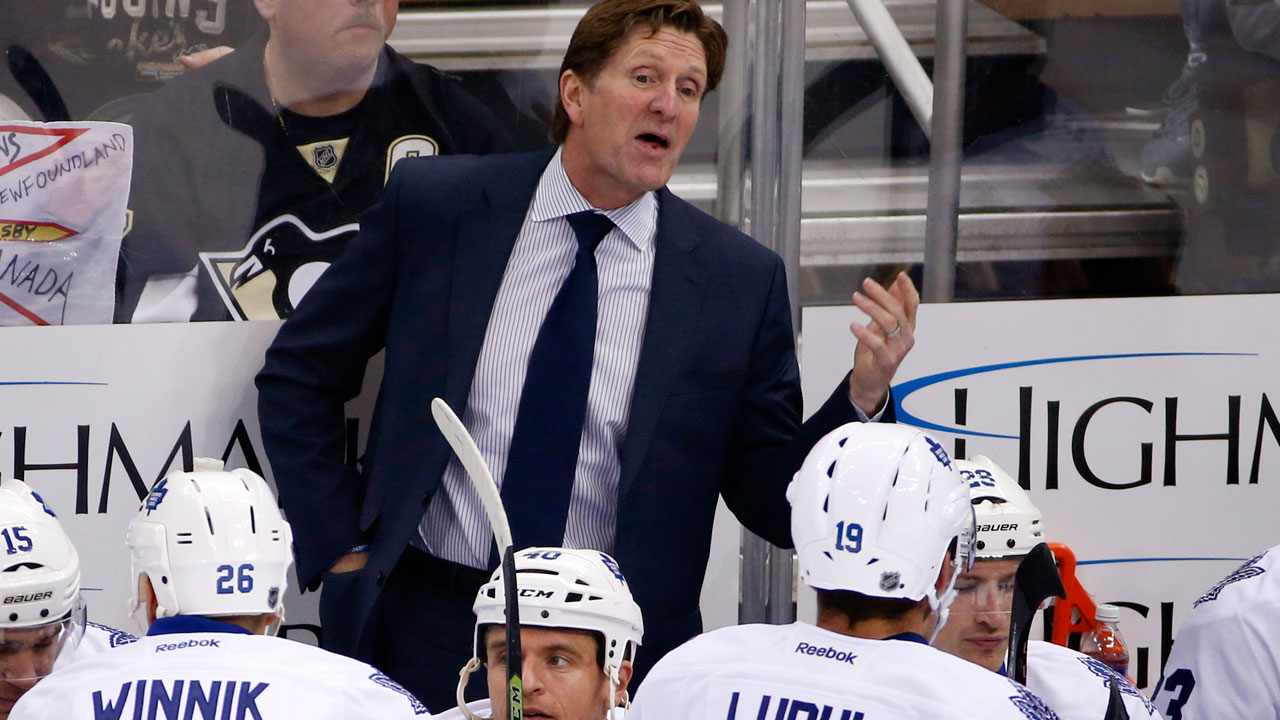Mike Babcock joined TSN 1050’s Leafs Lunch to discuss Bell Let’s Talk Day, mental health awareness, and the Toronto market. After practice, the Leafs head coach shared thoughts on Martin Marincin’s game, Nazem Kadri’s success, Mitch Marner’s progress, and the challenge ahead in Detroit on Wednesday.
Let’s talk about mental health awareness. In the sports world, we can easily also call it in the tough world – athletes are physically tough, mentally tough. It’s almost a survival-of-the-fittest mentality. As much as that image is alluring and inspiring to a lot of people, we’re starting to hear more and more athletes sharing their stories of dealing with mental health issues. Is it still a battle within the sports world, because of this veneer of toughness, to get athletes to open up? And if so, what are you trying to do to change that?
Mike Babcock: The first thing I’d say to you is the greatest thing about Bell Let’s Talk day is that we’re talking. When you start talking about mental health, what you’re doing is you’re encouraging people to educate themselves, to understand that one in five Canadians are affected by that. If you think about my dressing room, that is probably four to five people. So it’s real. Let’s not hide from it.
The second thing is that when you start creating dialogue and talking about it and the world changes because you’re more open to it, you can understand. When you look at someone like Clara Hughes – as much impact as she had on young girls winning summer and winter Olympic medals and the influence she’s had – she’s had much more influence by opening up about mental illness. Now she is as tough as any athlete that you’ve ever seen in your life. Mental toughness and mental illness have absolutely nothing to do with one another. We need to educate ourselves about that.
What I would say to you in the National Hockey League is it is about mental toughness. It is about playing through aches and pains. It is about grinding it out each and every night. That has nothing to do with mental illness.
The other thing is, you think about all the people you know that are on blood thinners or blood pressure medication… why is this different? Why can’t you have someone to talk to? Why can’t you have a doctor? Why can’t you have medication to help out and lead a normal life? We’ve just got to get rid of the stigma. The way you do that is by talking about it, and that’s what we’re trying to do.
How important is it, especially with a young team, to have your players know that if they do have an issue or a situation that they can come to your or management or whoever and say what they need to say and them understand that it’s not going to affect them on the ice?
Babcock: I think that’s important. I think what’s more important is when you have children of our own. What happened to my wife and I in our lives is we lost two close friends a couple of years back. At the same time, our kids were now leaving home. When you see your kids every single day and you’re in control of them and they live under your roof, you have a better read on them. When you’re talking to them on FaceTime or you’re texting them, you don’t have the same feel. I can think of nothing worse than one of my kids being away at college or with a billet at junior hockey and things aren’t going good and they’re suffering in silence. I think that’s a terrible thing. I think what you want to do as a prudent parent — and that’s what you are as a coach, especially with young guys like mine – is you want to have your eyes open, and you know who is struggling and who is not.
The other thing is, with the way the world is today with all this influx of information on their phone, if things aren’t going good and you’re getting beat on every day, it can’t be that positive for you. I think it’s so important that you have open dialogue. They might not say anything to you. You might have to ask them, “how’s it going?” and then get the discussion. And that would lead to things opening up.
In sports markets – Toronto being one of them – that have a lot of media attention and a lot of social media attention, what do you tell your players to make sure they don’t rely on those outlets to validate their existence, whether the message is positive or negative? Especially if it’s negative, that can snowball in a hurry and it’s very difficult to climb out of that hole.
Babcock: My wife the other day sent me an article on millennials and how they’re reinforced, or how many people — I don’t know enough about this, but the twitter world and that — follow you and how that makes you feel better about yourself. That’s not real. That is just not real. The people in your life that love you, and support you, and are in your family… you might have four or two good friends in the whole world besides your family. Just understand what that’s all about.
The other thing I think is so important in Toronto – we talk to our players about this all the time – is having something away from hockey you love to do. Hockey is not going to go good every day. When you’re playing real good, when you leave the rink, you never think about hockey. When you’re playing terrible, you think about it 24-7 and by the time you get back you’re worn out. You need something else that gives you satisfaction outside of the game. That can’t just be your Twitter.
How acute is your awareness now – you talk about your family and your kids – with your young players in trying to ascertain, “okay, I need to reach out to them,” or, “we’ve got to find out.” Has that certainly been increased over the last number of years?
Babcock: For sure. I’d like to tell you it is because of the mental health issue, but that’s not the reason. That’s part of it. The reason was, when my son when to junior hockey – I’ll never forget this as long as I live – he’d say to me, “I’ve been here eight weeks, I’m still trying out for the team, I haven’t talked to anybody.” That made me talk more to my players every day.
When my daughter went to play Division 1 soccer and she was going through the same kind of thing, that made me want to talk to my players more. Everybody needs to be talked to. Doesn’t matter how good you are, how old you are. Everybody wants to know where they stand.
Lou Lamoriello has a line. He says…. Well, geez, I better not say that. Here is what I would say to you: I’d rather know where I stand each and every day. What I mean by that – when I don’t hear from you, I don’t know what you’re thinking. But when we’re having dialogue – whether it be positive, whether that be negative – at least I know where I stand. The worst information is no information. Talk to your players.
Before we let you go – we keep asking the players what it’s like playing in this market. But what has it been like for you? Just the other day, when you were asked about the Calgary Flames and how they have nine players from the GTA, it took you a minute to be like, “what is the GTA?” Are you feeling more like a Torontonian? Are you learning the lingo here?
Babcock: I’ll tell you what – I love the city. I absolutely love it. I love where I live. I love the rink. I love the fans. I was born in Ontario. I was born in Manitouwadge, Ontario, even though I never lived here. I feel it’s a fantastic, fantastic market and a great place to live. Just like all markets, the more you win, the more fun it is to come to the rink. In saying that, we have all the resources and all the opportunity here to have a franchise that is second to none. I believe that is going to lure the Ontario players home. I really do. There is so much support for us here. Now, is that going to lead to pressure at times? Absolutely. What’s the matter with that? It just pushes you to be better. In saying that, the environment here is spectacular. The coverage is spectacular. We’ve just got to perform.
Tuesday Practice
Martin Marincin with six and a half minutes of shorthanded time last night, Mike. Obviously you trust him with a great deal with what he’s able to bring in that regard.
Babcock: The first thing is, the redlight should be flashing if you’re shorthanded that much. Lack of discipline with our sticks again. We can’t keep going to the box. I thought a couple of them were tough – the call on Nylander and the call on Hunwick were real tough calls. But, in saying that, the rest we deserved and we’ve got to do a better job of that. But Marty’s a good penalty killer, yes.
Is Nazem emerging as a bit of a leader in this room? I know he’s gotten the offensive production, but what does he bring to the table in that regard, do you think?
Babcock: I think the biggest thing is it’s not what you say it’s what you do. If you compete on a nightly basis, things go good for you. He likes to score. We like him to score. I like him to be good defensively. That’s how the team wins, and playing against good people, he’s got to do better in the faceoff circle. He knows. You’ve got to get better and better without the puck. Those are things he’s got to focus on. The powerplay – he got one from the flank but the spot in the middle is the best spot for him just because of the way he is and the courage he has around the net. Obviously, it’s going pretty good for him that way. He’s just got to keep them going.
Is the thinking when you put Kadri, Matthews and Nylander together after a PK just as simple as getting those guys ice time?
Babcock: That’s all it is. I hate doing it. It’s not what I want to do. When you play half of your shifts in a game…. What happens to us when we take penalties is we take penalties and then you lose your rhythm on the bench. Guys might have been playing good, and now they sit there for long periods of time. So that’s no good. You don’t get out there with your linemates and you don’t have the kind of flow.
When I do that at home, too, they come right back — because they know Naz is out on the wing — with their line that he’s supposed to be playing with. How long can you sit there and freeze to death? All it is is a warm-up factor for the fellas again.
They scored last night, though.
Babcock: There you go.
When Frederik Andersen gets his 20th win at the halfway mark, does that again underline the difference he’s made as far as success with this whole team?
Babcock: Obviously, you’ve got to have good goaltending. That comes from a number of things. Good players that compete hard and play well structurally and good defensively. The whole league is so good defensively. You have to be really good defensively and you’ve got to get great goaltending. Obviously, good penalty killing – a lot of it is about the structure and the work ethic and the faceoff and all of that, but it’s a lot about goaltending. You need goaltending.
Where have you seen the biggest progress in Mitch Marner’s game?
Babcock: I just think Mitch is a good player. He’s getting used to the league. I think Mitch can dominate more and more and more, to be honest with you. The more he skates and the more he plays defensively, the more he has the puck. When he gets more and more confidence in his shot, he’ll shoot the puck way more. The more you get the puck to the paint and to the net, the more your team scores. Sometimes we think, coming from other leagues, you can pass the puck into the net and make those kind of plays. It just doesn’t happen enough in the NHL. Simplifying your game and shooting the puck more is going to help him.
Will Rielly or Smith travel with you guys?
Babcock: I don’t know if they’re coming, to be honest with you. Rielly won’t be playing tomorrow, obviously. Leo and Bozak had maintenance days.
Does a business trip to Detroit come with any extra emotion at this point?
Babcock: I wouldn’t say that. I’m going to have dinner with my daughters. They go to U of M. So that’ll be nice. Other than that, I’ll be in the hotel getting ready for the game like anybody else.
Is a Jeff Blashill-coached club a mirror image to the way you think in terms of work ethic and all that goes with it?
Babcock: Blash is a real good coach, and I’m happy that he got the job there and all that. We’re coaching against each other now. The other thing that happens is, as you have more and more assistant coaches, you hire people to learn from. As much as you are going to teach them things yourself, you hire people to learn from and steal their ideas and make it your own and evolve as a coach. Blash has new coaches there now. He had different coaches last year. I’d imagine he’s evolving. What they do there is probably evolving as well. The big thing I know is that they’re playing real good. I watched the Rangers game here this morning, and I thought they played real solid with and without the puck. They’ve got real good depth up front. Now they seem to have three goals instead of just the two they had before. So, obviously, they’re a good team. They play tonight, which is fortunate for us. We’ve got to jump on them.

































